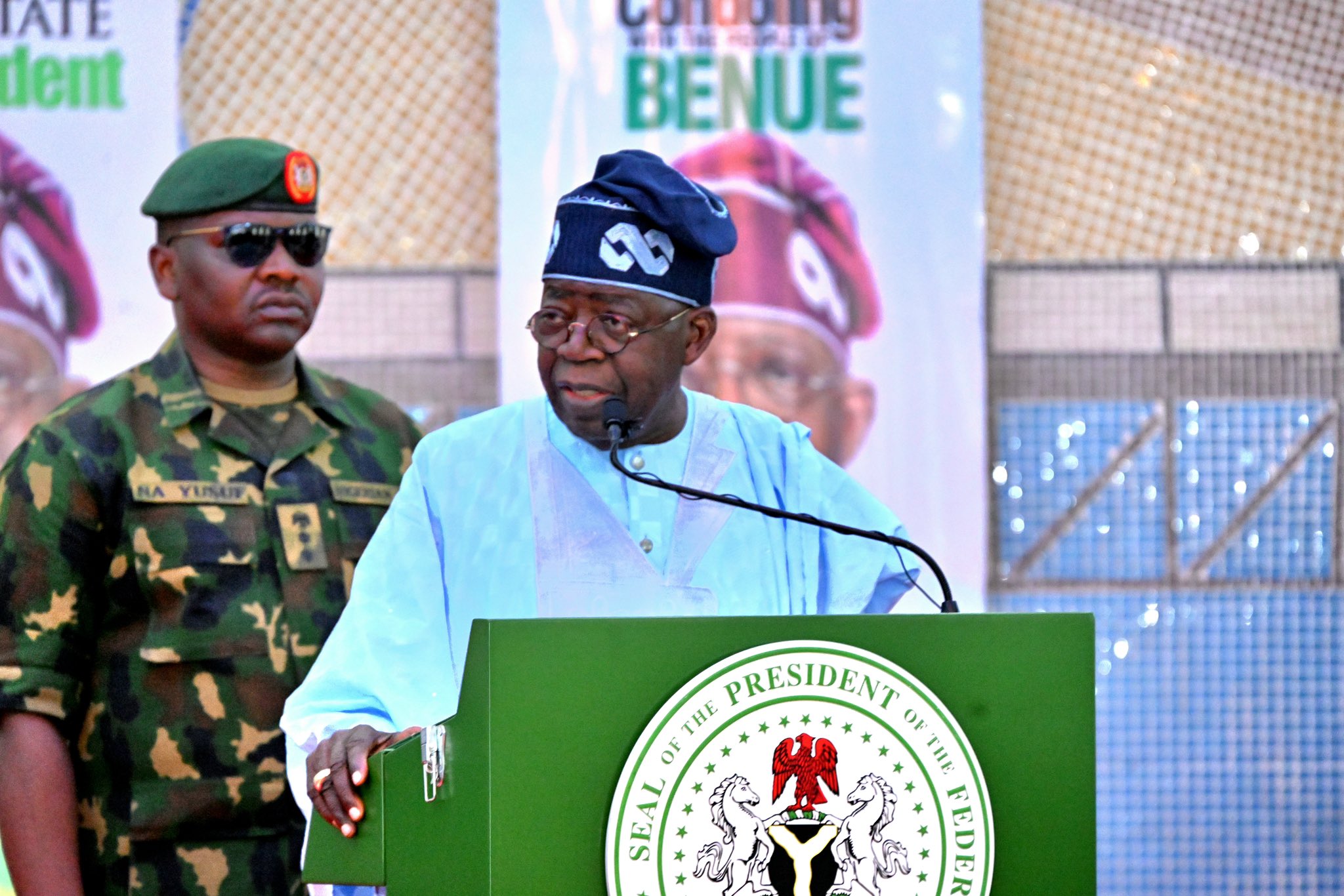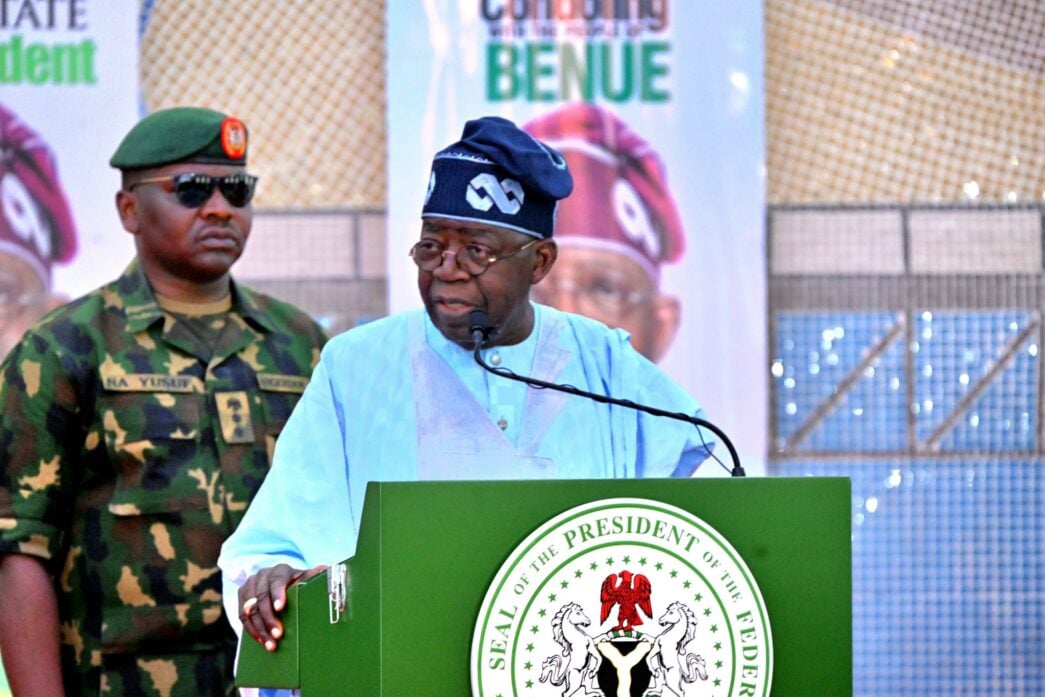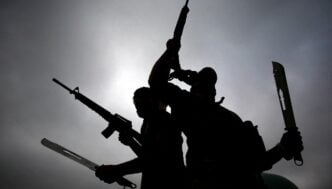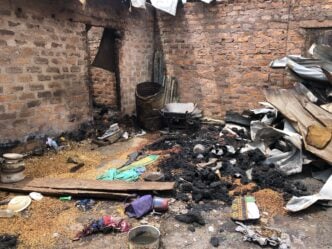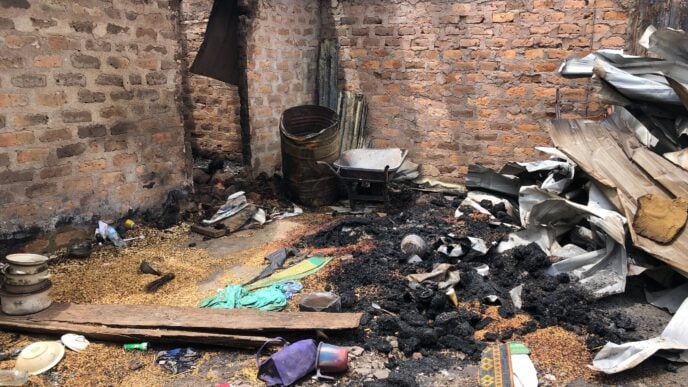File photo: President Tinubu at a stakeholders’ meeting in Benue
BY PATRICK IWELUNMOR
Power, in its raw essence, is both a blessing and a burden. It creates and destroys with equal passion. It builds cities and breaks civilisations, heals nations and wounds them in the same motion. In Yoruba cosmology, this duality finds its perfect symbol in Ogun, the deity of iron, war, and invention, whose forge births both the tools of progress and the weapons of destruction. Ogun is not a gentle god. He is the fire that clears the forest for new life, yet the same fire that can consume the farmer’s hut if left unchecked.
In the theatre of world politics, no nation mirrors Ogun’s paradox more than the United States of America. It is the healer who wounds, the liberator who invades, the smith who forges both the ploughshare and the sword. Its moral grammar is written in contradictions. It speaks the language of democracy even as its bombs speak louder in foreign lands. America’s power, like Ogun’s, oscillates between creation and chaos, invention and invasion.
When Donald Trump, that volatile force of American politics, thundered that he would “bomb terrorists killing Christians in Nigeria,” the world recoiled. Yet beneath his typical bluster lies a question worth pondering. For over two decades, Nigeria has been tormented by the demons of terror. Villages have been burned, churches razed, mosques bombed, and farmers murdered in their fields. From Borno to Benue, Zamfara to Plateau, the land has become a scarred map of grief.
Advertisement
Our national leaders promise fire but deliver fog. Some negotiate with killers as though they were business partners, while others silence peaceful protesters with the same zeal they should reserve for terrorists. Nigeria’s sovereignty has too often been reduced to the right to mourn in private. So when Trump speaks, even if crudely, of striking the agents of terror, many Nigerians, especially the forgotten victims in the hinterlands, feel a conflicted sense of relief. If the shepherd sleeps, should the sheep reject the stranger’s hand that drives away the wolves, provided it does not steal the flock?
Still, America’s interventions, like Ogun’s temper, are dangerous when unrestrained. The same nation that rebuilt Europe through the Marshall Plan also destabilised Iraq. The same aircraft that delivered food to Sarajevo dropped bombs on Baghdad. The same rhetoric that defended freedom in Vietnam scorched villages in the name of liberation. America, the Ogun of the modern age, must learn that its greatest power lies not in the heat of its forge but in the wisdom of its restraint. The world does not need saviours with missiles in their mouths; it needs craftsmen who can shape justice without shattering peace.
Fire without conscience is arson, and might without morality is madness. The Ogunian paradox teaches that the mastery of power is not in its force but in its focus. America’s challenge, therefore, is to temper its fury with mercy, to strike not in arrogance but in empathy.
Advertisement
Nigeria, too, must confront its own paradox. Our failure is not only military; it is moral, institutional, and spiritual. President Bola Ahmed Tinubu did not create the monster of terrorism; he inherited it. But leadership, by its very definition, is not an inheritance but a calling. Tinubu can only extricate himself from blame by demonstrating the capacity to be both decisive and ruthless against those turning his country into a slaughter slab. History will not judge him by the excuses he inherited but by the fire he commands to quench the inferno.
Yet this task transcends Tinubu’s personal courage. It demands institutional renewal, the rebuilding of a security system that has grown corrupt and complacent, the purging of compromised officers who trade lives for bribes, and the dignifying of the armed forces whose morale has been battered by years of neglect. The Nigerian state must evolve from negotiating with terror to becoming its nemesis.
Tinubu’s presidency will be defined not by the eloquence of his speeches but by the effectiveness of his reforms. His success depends on whether he can turn the rhetoric of renewed hope into the reality of renewed justice. Terrorism cannot thrive where the state is awake, accountable, and uncompromised. It survives only where power has lost its moral compass.
However, the opposition must tread carefully. It is both tempting and tragic to exploit this season of blood for political capital. Tinubu once mocked Jonathan when Nigeria bled; today, he faces his own baptism of blood. But history keeps meticulous records, and karma does not forget. The ancient proverb warns, “Do not rejoice when your enemy falls, lest the Lord see it and turn His wrath away from him.” In moments of national grief, mockery becomes moral blindness.
Advertisement
The pain of Nigeria is not a partisan wound. The bombs that fall on Plateau do not ask for party membership before they kill. The bullets that rip through Benue do not discriminate between APC and PDP, Christian and Muslim, rich and poor. Terror does not care for political geography. What this moment demands is not rivalry but solidarity, a collective awakening of conscience that rises above political tribes and religious fault lines.
And let it be said without ambiguity that the killings in Nigeria are not confined to one faith. Christians have indeed suffered grievously, but so have Muslims, traditionalists, and all who dwell in the zones of terror. The true conflict is not between religions but between civilisation and savagery. It is a war between those who build and those who destroy, between the architects of order and the apostles of chaos.
In this context, the reaction of some Nigerians to America’s warning is deeply troubling. Many, in their zeal to appear patriotic, descend into boastful defiance and performative nationalism. But true patriotism is not loud; it is wise. It does not roar in ignorance; it reasons in dignity. Mature nations defend their sovereignty through diplomacy, not tantrums. The loudest nations are not always the strongest. Often, they are the most insecure.
If Nigeria must challenge America, let it do so through the power of intellect, negotiation, and moral credibility, not through emotional grandstanding. Nations that scream the loudest about sovereignty are often those that have lost it within. Dignity is not achieved through denial but through disciplined dialogue.
Advertisement
Ultimately, both America and Nigeria stand before the same divine forge, confronting the same moral dilemma: how to wield power without losing soul. America must temper its Ogunian fire with humility, and Nigeria must reclaim its Ogunian spirit with purpose. One must learn restraint, while the other must rediscover resolve. The sword of justice must never swing without cause, and the hammer of leadership must know when to strike and when to stay its hand.
If America embodies Ogun’s creative fire, Nigeria must embody his moral discipline. America’s power must be guided by conscience, just as Nigeria’s suffering must be transformed into reform. The Ogunian paradox reminds us that the fire that burns also illuminates, that strength without wisdom is self-destruction, and that true leadership is not in noise but in nuance.
Advertisement
In the final analysis, peace, like iron, is not found; it is forged. And only those who understand both the fire and the hammer can shape the world without destroying it.
Advertisement
Views expressed by contributors are strictly personal and not of TheCable.
